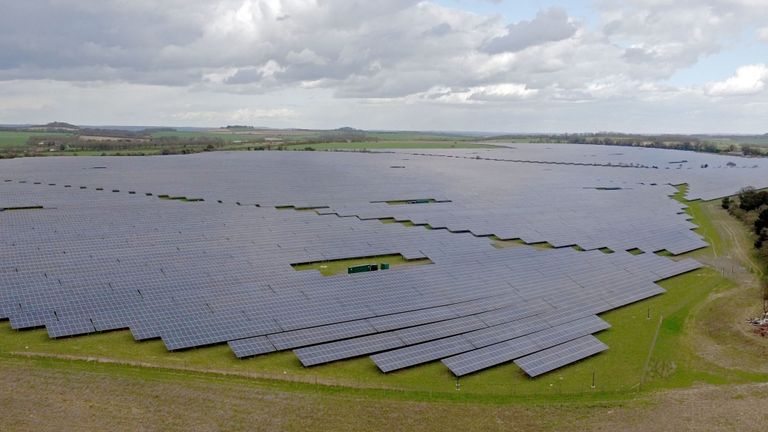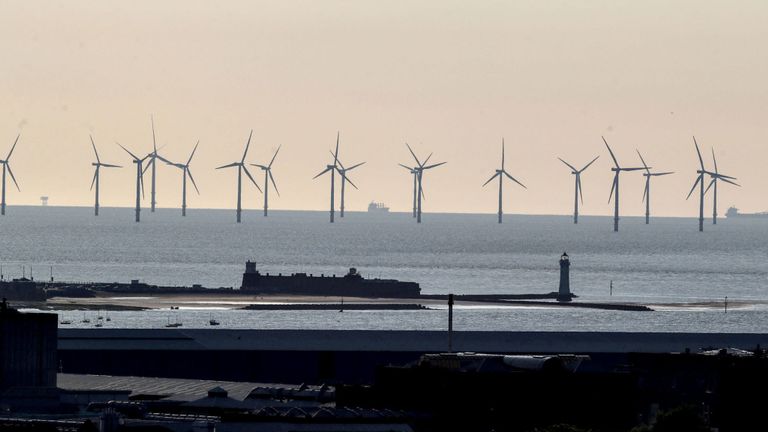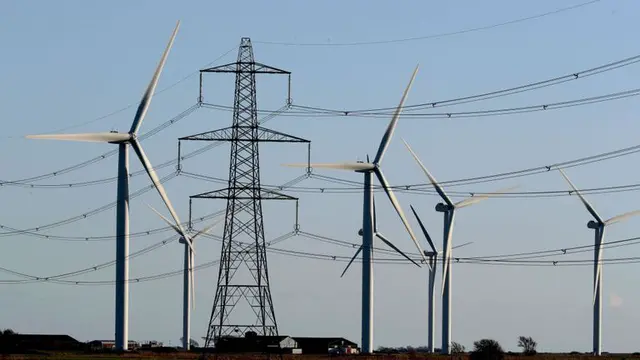For the first time ever, more power came from renewable sources than from fossil fuels for a full 12 months during 2019.
Figures released by the National Grid show wind farms, hydro plants, solar and nuclear energy - alongside clean power imported by sub-sea cables - delivered 48.5% of Britain's electricity in 2019.
That compares to 43% generated by fossil fuels.

Image:Wind farms, hydro plants, solar and nuclear energy have overtaken fossil fuels
The remaining 8.5% was generated by biomass, which is renewable but produces carbon emissions when the wood pellets used to make the power are burned.
National Grid CEO John Pettigrew told Sky News: "2019 is a massively historic milestone in that it's the first time ever in the UK that we've had more electricity produced from zero carbon fuels than from fossil fuels.
"Over the last 10 years, we've seen a gradual shift away from fossil fuels. So in 2009, about 30% of electricity in the UK was produced by coal but what's been happening over the last decade is a move towards wind and solar as well as zero carbon electricity from Europe being important into the UK as well."
There are more projects in the pipeline including a cable under the North Sea to connect the UK with Norway in order to harness hydro power being generated there. It is one of six so-called "interconnectors" - cables between European countries and Britain - either in operation or under construction.
But while progress is being made, Mr Pettigrew says there are still challenges if the UK is to achieve its target of net zero carbon emissions by 2050.
He added: "If you're going to achieve net zero you've got to decarbonise energy which is something the National Grid is really focused on, but also you've got to decarbonise transport.
"If you think about decarbonising transport it's really about moving from traditional petrol and diesel for cars to electric vehicles.
"If we're going to achieve net zero you're probably going to see something like 36 to 40 million electric vehicles by 2050 and all those cars need to be charged so the National Grid is thinking very carefully about how we actually make sure that we've got the infrastructure that we need."

Image:The UK 'is really well-placed for capturing wind energy or tidal energy', engineers say
At the Univeristy of Warwick, a team of scientists are working on developing batteries used in electric vehicles.
As well as trying to improve their efficiency they are also looking at how they could be used beyond the automotive industry.
Stene Charmer, lead engineer for battery systems at the Warwick Manufacturing Group, says as electric vehicles improve, older models will come out of use and their batteries could be developed into units that could store renewable power.
"The UK is really well-placed for capturing wind energy or tidal energy," he said. "But storing that energy such that we can get it on the demand that we need is something that still needs to grow.
"These will be assembled into what we call second-life battery packs and be stored in our homes, stored in factories or warehouses up and down the land and they'll capture that wind energy and store it such that you and I can boil our cup of tea when we need it."
There is consensus across the industry that the pace of change needs to accelerate now we are just 30 years away from 2050.
The National Grid has included nuclear power in its figures for renewable energy but there is a debate over how big a part nuclear should play in powering Britain in the future.
"Nuclear power has always been a fairly controversial area" says Mark Sommerfield who is policy director at the Renewable Energy Association.
"It is recognised as a low carbon solution and therefore probably does have a role to play in decarbonising the energy grid. Of course there are significant concerns around it particularly around what you do with that nuclear waste."
Mr Pettigrew says nuclear "doesn't have to be part" of meeting the net zero target.
He added: "As we move forward over the next thirty years some of those nuclear stations are going to close and one of the debates will be will they be replaced with new nuclear or replaced with renewables such as wind and solar so that's not entirely clear at the moment but that will work itself out over the next 20 to 30 years."
 简体中文
简体中文

